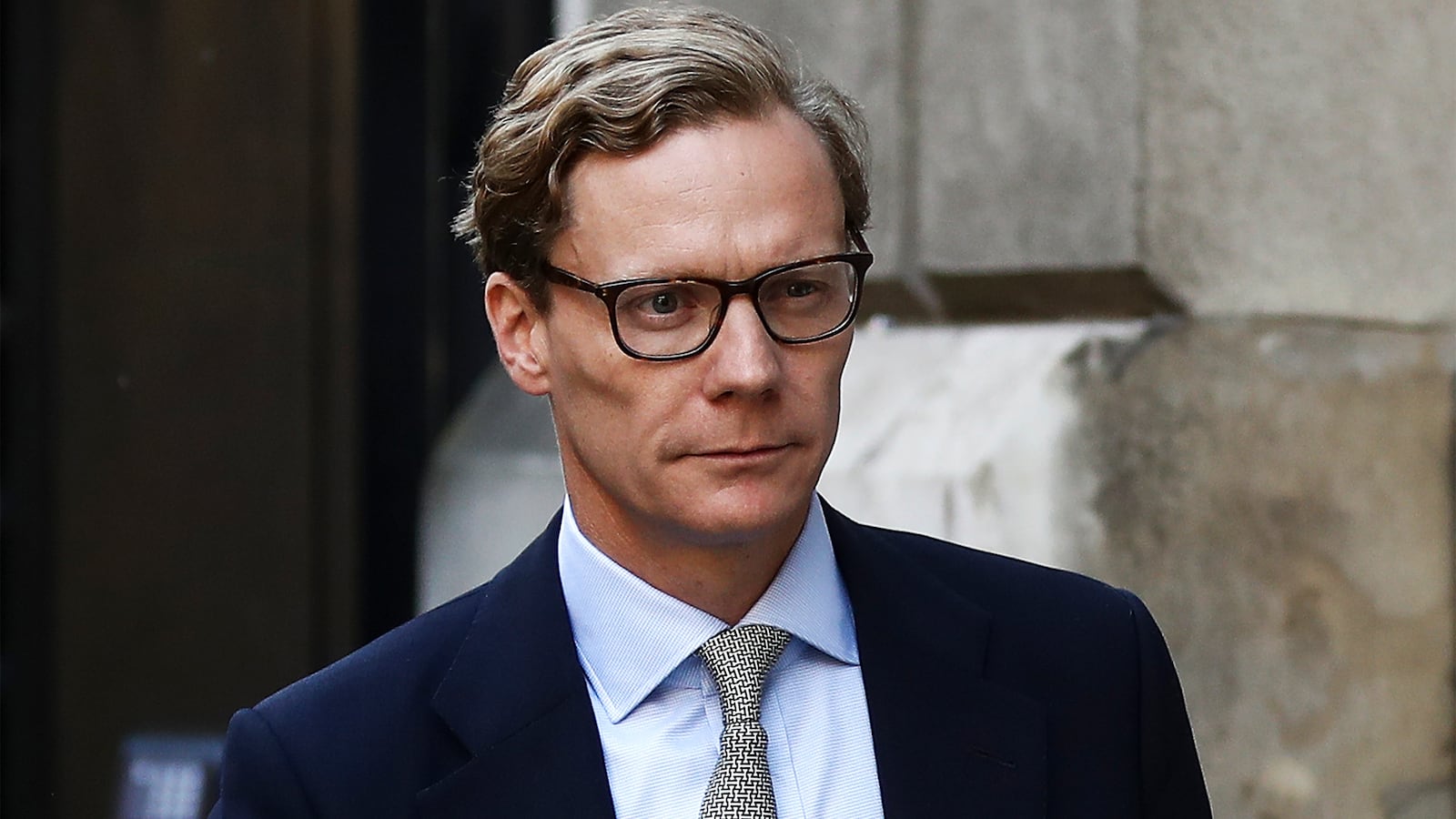LONDON—British political consultants that worked for Donald Trump’s presidential campaign liked to boast that they could deploy dirty tricks and twist democracies all over the world without the risk of detection.
The High Court in London heard on Monday that Cambridge Analytica was up to its old tricks from beyond the grave—by surreptitiously trying to halt investigations that could expose allegedly nefarious tactics before the company was shut down for good.
The company filed for the British equivalent of chapter 11 bankruptcy last year after undercover Channel 4 reporters secretly recorded its boss, Alexander Nix, claiming that Trump’s data gurus had carried out illicit election campaigns all over the world. The company was also accused of using up to 87 million clandestinely harvested Facebook profiles to create a state of the art voter database that helped Trump win election in 2016.
A lawyer representing a New York professor, who believes his private data was misused by the notorious campaign operatives, claims Cambridge Analytica’s data secrets are being shielded from justice and exposure by administrators in the pay of a shadow company set up by a band of executives linked to the Trump campaign veterans.
The High Court heard that administrators had deliberately misled a judge during a previous hearing by obfuscating their financial links to Emerdata, a company which was set up by Nix, Rebekah Mercer, and other senior figures who were previously involved with Cambridge Analytica.
In Britain, court-appointed administrators are supposed to work independently on behalf of all creditors to take over running of the company, similar to chapter 11 bankruptcy in the U.S. But the legal team of David Carroll, an associate professor at Parsons School in New York who is fighting for access to the data compiled on him, claimed that the administrators of Cambridge Analytica has succumbed to undue influence. Emerdata appointed the administrator and subsequently committed to pay them up to $1 million in fees.
The administrators, Vincent Green and Mark Newman of Crowe U.K. LLP, were accused of trying to liquidate the company before a full investigation into the company could be held.
“It is extremely unusual, in my submission, to have the fees of an administrator underwritten effectively by the people who may themselves be the principal focus of any subsequent investigation,” said Andreas Gledhill Q.C., the lawyer representing Carroll in court.
Carroll’s team hope the High Court judge will fire the administrator and pass the case to government receivers who would then appoint a new administrator willing to investigate legal breaches at Cambridge Analytica and five other interrelated companies.
“This needs to go to the official receiver and there needs to be a whole set of investigations—someone needs to crack the vault,” Ravi Naik, a lawyer for Carroll told The Daily Beast outside court. “Without this case being successful, there cannot be an investigation because the company will liquidate. This is the dying embers.”
In documents submitted to the court, Gledhill claimed that Emerdata was due to pay the administrator up to £800,000 ($1 million) but had only handed over around £220,000 ($290,000) so far.
“With their legal fees funded by Emerdata, the administrators have treated this as hostile litigation between themselves and Mr. Carroll, making their lack of independence abundantly clear,” Gledhill said.
Rebekah and Jennifer Mercer, daughters of billionaire Trump donor Robert Mercer, are listed as directors of Emerdata. As is former Cambridge Analytica chairman Julian Wheatland, who is named on the list of people close to President Trump being probed by the House Judiciary Committee, alongside Nix, who resigned as a director of Emerdata on the same day that he was called back for further questioning by a committee in Britain’s House of Commons. Nix remains a shareholder.
The dispute between Carroll and Cambridge Analytica began when the professor read about the alleged use of data in the 2016 presidential campaign. Under British law, companies are required to disclose what information they hold on any individual who asks for it, so Carroll filed a formal request. Cambridge Analytica repeatedly refused to hand the information over until it entered administration last year.
Notionally, Carroll’s involvement in this case is due to his role as a creditor who is potentially owed around £5,000 ($6,600) for the personal data breach.
“Even if I were to get the money, it's tiny fraction of the amount of money that I'm risking,” he told The Daily Beast. “It's about searching for the answers and triggering accountability. If it wasn't for me they would just rubberstamp it—and they'd be gone.”
His contention is that there are millions of other people whose data was stolen and misused by Cambridge Analytica.
On Monday, the High Court heard that press reports following Cambridge Analytica’s bankruptcy speculated that Emerdata might take up the baton and continue the controversial company’s work under another name.
Court documents submitted by Carroll’s team claimed that the administrators had also failed in their most basic duties: “Employees have refused to return laptops to the Administrators, and others have been stolen from the Administrators’ custody. Adding to concerns that the Cambridge Analytica business continues to be carried-on under another guise, as at November 2018, former employees were apparently still accessing its cloud-based infrastructure.”
Gledhill told the court that it was vital for Mr. Justice Norris to refuse to grant Crowe’s bid to become liquidators and shut the company down permanently.
“This case has attracted exceptional public interest and in our submission the standard of independence in this case should be correspondingly high. We say that the administrators cannot meet that standard both because of the appearance of bias and because they are in fact biased,” he said.
Gledhill claimed that Emerdata’s favored administrators had gone to extremes in order to avoid complying with the regulator which ordered Cambridge Analytica to respond to a subject access request (SAR) from Carroll. He wanted to know what information had been obtained on him, where it had come from, and how it was used. The Information Commissioner's Office ended up taking the company to court, and Cambridge Analytica parent company SCL was convicted of breaking the law in January.

Rebekah Mercer.
Patrick McMullan/Getty“It speaks volumes about the extent to which the administrators are beholden to Emerdata that, despite their status as officers of the court… they preferred to expose [SCL] Elections to criminal sanction for failure to cooperate with a regulator, rather than yield an inch to Professor Carroll’s SAR.”
Gledhill said it may have been enough to avoid the conviction if the administrators had made their best endeavors to comply. “Had they done that in any subsequent criminal proceedings they would have had a defense … They didn't even try at all.”
He said that would have been easy: “What was there to prevent the administrator from sitting down with Mr. Nix or Mr. Wheatland” and asking what they remembered about where the vast swathes of data on up to 200 million American voters had come from?
Catherine Addy QC, representing the administrators in court, said her clients had cooperated as much as they could with the regulators. She said it was impossible to track down Carroll’s personal information amid 700 terabytes of data that has been seized by the Information Commission. She also insisted that the administrators had no idea that there was an ongoing process to access that material when they were appointed.
She claimed Carroll’s legal team was “using the media and political storm cloud” to try to hold up the normal procedures of the court.
The judge has reserved his judgment on whether Crowe should be dismissed as the administrator. He is expected to rule in the coming days.








